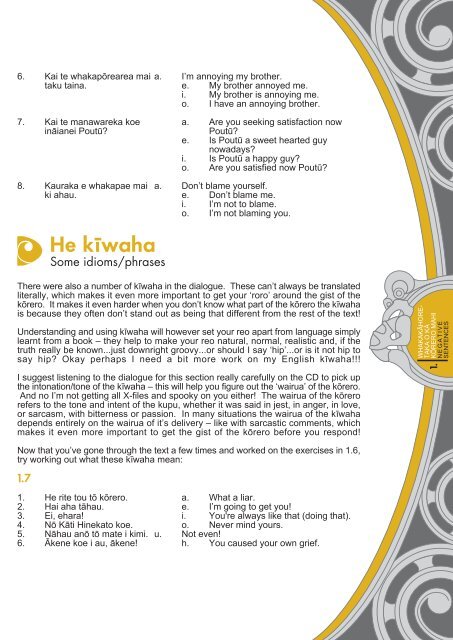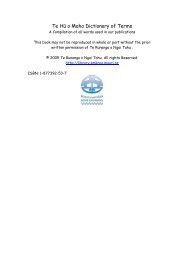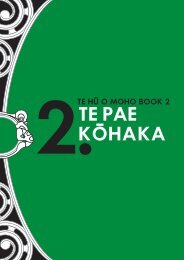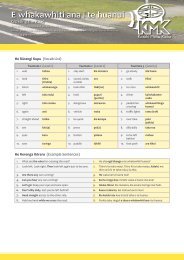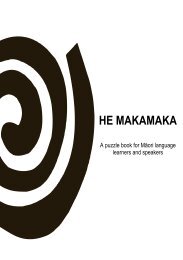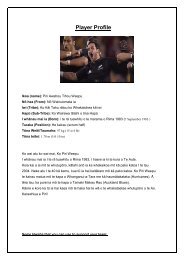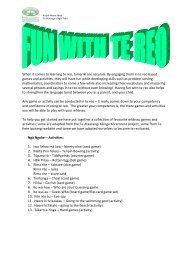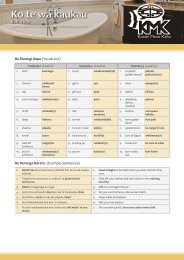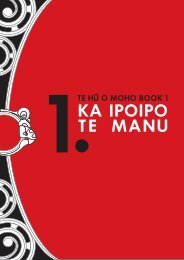Te Hū o Moho Book 4 - Te Pirere - Kotahi Mano Kaika
Te Hū o Moho Book 4 - Te Pirere - Kotahi Mano Kaika
Te Hū o Moho Book 4 - Te Pirere - Kotahi Mano Kaika
Create successful ePaper yourself
Turn your PDF publications into a flip-book with our unique Google optimized e-Paper software.
6. Kai te whakapörearea mai a. I’m annoying my brother.<br />
taku taina. e. My brother annoyed me.<br />
i. My brother is annoying me.<br />
o. I have an annoying brother.<br />
7. Kai te manawareka koe a. Are you seeking satisfaction now<br />
inäianei Poutü?<br />
Poutü?<br />
e. Is Poutü a sweet hearted guy<br />
nowadays?<br />
i. Is Poutü a happy guy?<br />
o. Are you satisfied now Poutü?<br />
8. Kauraka e whakapae mai a. Don’t blame yourself.<br />
ki ahau. e. Don’t blame me.<br />
i. I’m not to blame.<br />
o. I’m not blaming you.<br />
Some idioms/phrases<br />
There were also a number of kïwaha in the dialogue. These can’t always be translated<br />
literally, which makes it even more important to get your ‘roro’ around the gist of the<br />
körero. It makes it even harder when you don’t know what part of the körero the kïwaha<br />
is because they often don’t stand out as being that different from the rest of the text!<br />
Understanding and using kïwaha will however set your reo apart from language simply<br />
learnt from a book – they help to make your reo natural, normal, realistic and, if the<br />
truth really be known...just downright groovy...or should I say ‘hip’...or is it not hip to<br />
say hip? Okay perhaps I need a bit more work on my English kïwaha!!!<br />
I suggest listening to the dialogue for this section really carefully on the CD to pick up<br />
the intonation/tone of the kïwaha – this will help you figure out the ‘wairua’ of the körero.<br />
And no I’m not getting all X-files and spooky on you either! The wairua of the körero<br />
refers to the tone and intent of the kupu, whether it was said in jest, in anger, in love,<br />
or sarcasm, with bitterness or passion. In many situations the wairua of the kïwaha<br />
depends entirely on the wairua of it’s delivery – like with sarcastic comments, which<br />
makes it even more important to get the gist of the körero before you respond!<br />
WHAKAKÄHORE-<br />
TAKA O KÄ<br />
KÖRERO MAHI<br />
NEGATIVE<br />
SENTENCES<br />
1.<br />
Now that you’ve gone through the text a few times and worked on the exercises in 1.6,<br />
try working out what these kïwaha mean:<br />
1.7<br />
1. He rite tou tö körero. a. What a liar.<br />
2. Hai aha tähau. e. I’m going to get you!<br />
3. Ei, ehara! i. You're always like that (doing that).<br />
4. Nö Käti Hinekato koe. o. Never mind yours.<br />
5. Nähau anö tö mate i kimi. u. Not even!<br />
6. Äkene koe i au, äkene! h. You caused your own grief.


